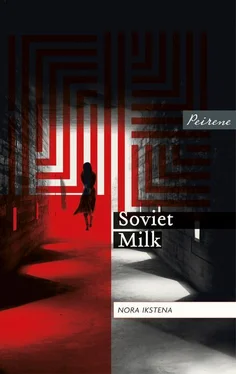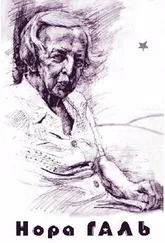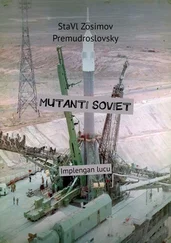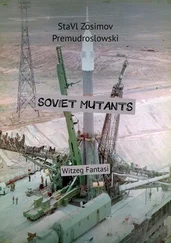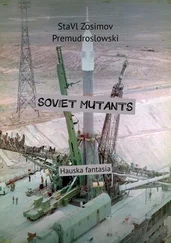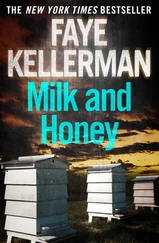I cared for my mother as best I could. She wrote a note requesting that I be excused from school. In the mornings, sitting on my mother’s bed, we breakfasted together. At midday we ate a lunch that I prepared. Dinner we just had snacks. Mother read to me from her books. From Moby-Dick, of course. ‘Call me Ishmael,’ she exclaimed in a feeble voice before each reading. I didn’t understand the ungodly God-like man, monomaniacal Captain Ahab, and his obsession with the white whale. In my opinion it was a doom-filled book. But it visibly cheered my mother.
My mother’s return to daily life was a good time. She smoked less and didn’t take any tablets, at least in my presence. Her interest in food returned and, probably for the first time, she praised me for the meals I made. ‘Who taught you this?’ she asked, savouring a casserole or sipping a soup. ‘How did you figure this out? Well yes, you’re a big girl now. Are you already thirteen?’
During our leisure time, a schoolmate arrived with news that a monument was being unveiled in our village. Right by the railway station, not far from my beloved embankment by the tracks. It turned out that more than fifty years ago in our undistinguished country station a Russian diplomatic courier had been killed. He had become a hero in Russia, and therefore now also a hero in Latvia. My mother dismissed all this as bootlicking. That was a favourite expression of hers. I had several questions for her. Who and why would someone do that? My mother explained that when Latvia was free, you didn’t have to lick Russia’s boots. ‘Now we have to erect a monument to some dubious spy.’
I didn’t understand what she was talking about. I had a much bigger task to think about than our enchained Latvia. For the monument’s unveiling I was to recite a stanza from Vladimir Mayakovsky’s poem ‘The Boat’, which he had dedicated to the railway station’s hero. Although I was assiduously attempting to learn Russian, reciting by heart was daunting! I begged my mother to help me. So for several days our reading time began with ‘Call me Ishmael’ and ended with my desperate attempts to remember the stanza and my mother’s sarcastic comments:
My zhivyom, zazhatye zheleznoy klyatvoy
We live with a cast-iron oath on our lips
Za neyo na krest, i puleyu cheshite.
For this oath we would give away bullets.
Cheshite, cheshite.
Away, away.
(Mother: Let him go away for once!)
Eto, chtoby v mire bez Rossiy, bez Latviy
So that this world beyond Russia and Latvia
Zhit yedinym chelovechynim obshchezhityem.
Would be a single common abode.
(Mother: This he said well – humanity’s communal flat!)
V nashikh zhilakh krov, a ne voditsa.
In our veins blood, not water.
My idyom skvoz revolverny lay.
We walk through the sound of shooting.
(Mother: Dogs, Russian dogs!)
Chtobi umiraya voplotitsa
So on dying we may become
V parakhodi, v strochki i v drugiye dolgiye dela.
Boats, lines of poetry and other eternal things.
‘Call me Ishmael!’
In a strange way my mother’s comments helped me remember this taxing combination of words and lines, and the pronunciation, which was tying my Latvian tongue in knots. The hardest thing to say in Russian was the term for dormitory, chelovechynim obshchezhityem, which was almost as hard as our Latvian term for narrow-gauge railway, šaursliežu dzelzceļš. My mother began to like this game. She started to teach me to add emotion to my reciting. She parodied a man’s deep voice and soon we were doubled over in giggles. In the end I was heartily grateful to Russia’s diplomatic courier for getting shot precisely at our railway station, and even more grateful to Mayakovsky for giving my mother and me such moments of rare happiness.
I recited my stanza at the monument so enthusiastically that my Russian teacher broke down in tears, while my Latvian teacher hatched a plan to send me to the regional reciting competition.
I skipped home to my mother, splashing through the autumn leaves and loudly crowing, ‘Call me Ishmael! Call me Ishmael!’
My mother wasn’t at home. She was back chained to her ambulatory centre. I happily fed the dog, lit the wood stove and began to peel potatoes. I felt a cold draught from Mother’s room, where she had left the window open. An ashtray lay on the bed beside Moby-Dick. In it was a bookmark. More precisely, it was a small piece of paper covered with fine print, torn out of a book. I examined it carefully, because I had never seen it in our house. There were also delicately printed numbers on the page. Beside the numbers eleven and twelve I read the following:
And the angel of the Lord said unto her, Behold, thou art with child and shalt bear a son, and shalt call his name Ishmael; because the Lord hath heard thy affliction.
And he will be a wild man; his hand will be against every man, and every man’s hand against him; and he shall dwell in the presence of all his brethren.
*
They were strangely empty days and nights – when she went to stay with my mother and stepfather in the city. The dog wouldn’t leave her room but stayed curled up on the rug under her desk. Everything seemed empty, cold and silent, and I would gladly have spent the night at the ambulatory centre. I never went with my daughter, because I didn’t want to darken their meeting times, which were too brief already.
She usually visited them on Saturdays and Sundays. Time grew particularly burdensome on these days. I felt weighed down, as if I could never be free. Now and then I would go to the ambulatory centre, sit in my office and mechanically fill in the senseless record cards. Occasionally I stayed in bed for hours, smoking and reading, but everything seemed an aimless waste of time. Delivered on Fridays, the Russian medical journals could not cheer me. Soviet medical science was limping forward. Pitifully small advances could be gleaned from it. A façade obscured everything – the senseless party and regime proclamations, intended to demonstrate the regime’s care for Soviet citizens, especially for its mothers and children:
Mothers who have given birth to and raised ten children shall be awarded the order ‘Mother Hero’, and mothers who have raised nine children will receive the order ‘Mother Glory’, mothers of six children will be awarded the ‘Mother’s Medal’ Grade I. In socialist states all children have equal rights; these are not dependent on their ethnic origin, race, place of birth, economic status.
I never raised questions among my women patients, never counselled anyone to have an abortion. But giving birth and letting a child enter this world in this time and place seemed to me as senseless as everything else that was going on around us. We were cut off from the world. We were destined for a somnambulant existence and condemned to call it life. And I found myself at the heart of this somnambulism. I, one of the rank and file, day after day promoting and pursing senselessness.
But I wasn’t thinking straight. Who else but my daughter could shine a beam of light into this sleepwalking existence? She suffered this exile at my side. Driven from a brilliant Soviet medical career, from its congresses, its bribes and backhanders. Excluded from science and its wondrous future discoveries. Banned from taking part in the most amazing discovery of all: human fertilization outside the human body.
During these empty days I had time to dwell. Scenes from the past resurfaced. I remembered my father telling me that he and my mother had had several opportunities to leave Latvia for Germany at the end of the war. Mother had been eight months pregnant with me. There was time before the Red Army invaded Riga. People were fleeing wherever they could, risking their lives, hiding in the forests by the sea, waiting for fishermen’s boats bound for Gotland, in Sweden. My parents had had relatively safe opportunities to leave. But my mother had refused. She wanted her child to be born in her native land.
Читать дальше
